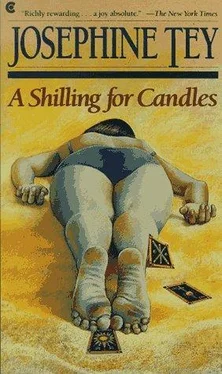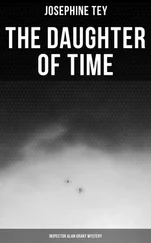Josephine Tey - A Shilling for Candles
Здесь есть возможность читать онлайн «Josephine Tey - A Shilling for Candles» весь текст электронной книги совершенно бесплатно (целиком полную версию без сокращений). В некоторых случаях можно слушать аудио, скачать через торрент в формате fb2 и присутствует краткое содержание. Год выпуска: 1936, Жанр: Классический детектив, на английском языке. Описание произведения, (предисловие) а так же отзывы посетителей доступны на портале библиотеки ЛибКат.
- Название:A Shilling for Candles
- Автор:
- Жанр:
- Год:1936
- ISBN:нет данных
- Рейтинг книги:4 / 5. Голосов: 1
-
Избранное:Добавить в избранное
- Отзывы:
-
Ваша оценка:
- 80
- 1
- 2
- 3
- 4
- 5
A Shilling for Candles: краткое содержание, описание и аннотация
Предлагаем к чтению аннотацию, описание, краткое содержание или предисловие (зависит от того, что написал сам автор книги «A Shilling for Candles»). Если вы не нашли необходимую информацию о книге — напишите в комментариях, мы постараемся отыскать её.
A Shilling for Candles — читать онлайн бесплатно полную книгу (весь текст) целиком
Ниже представлен текст книги, разбитый по страницам. Система сохранения места последней прочитанной страницы, позволяет с удобством читать онлайн бесплатно книгу «A Shilling for Candles», без необходимости каждый раз заново искать на чём Вы остановились. Поставьте закладку, и сможете в любой момент перейти на страницу, на которой закончили чтение.
Интервал:
Закладка:
"Our oath is for life. Nothing that happens outside these walls is of interest to any member of our Order."
"So you deny that you are Herbert Gotobed?"
Grant was conducting the conversation automatically. What his mind was occupied with, he found, was that the expression in the man's small pale eyes was hate. He had rarely seen such hate. But why hate? That was what his mind asked. It should be fear, surely?
Grant felt that to this man he was not a pursuer but someone who had butted in. The feeling stayed with him while he took his leave and all the way back to the hotel opposite the tobacconist's.
Williams was brooding over a cold meal he had caused to be set for his superior. "Any news?" Grant asked.
"No, sir."
"No word of Tisdall? Have you telephoned?"
"Yes, I telephoned about twenty minutes ago. Not a word, sir."
Grant slapped some slices of ham between two pieces of bread. "Pity," he said. "I'd work much better if Tisdall were out of my mind. Come on. There isn't going to be much bed for us tonight."
"What is it, sir? Did you find him?"
"Yes, he's there all right. Denied he was Gotobed. They're not allowed to have any worldly transactions. That is why he was so shy in the shop. Didn't even wait to see who the second person behind the counter was: just fled at the very prospect of a watcher. That's what's worrying me, Williams. He seems much more occupied with not being chucked out of the order than with being run in for murder."
"But his running out of the shop might have been because he wanted to keep on in hiding. That monastery place is as good a hideout as a murderer could wish for."
"Ye-s. Yes, but he's not frightened. He's angry. We're spoiling something for him."
They had been going quietly downstairs, Grant eating large mouthfuls of his improvised sandwich. As they approached the ground floor they were confronted by an enormous female who blocked their exit from the stairway. She had no poker in her hand, but the effect was the same.
"So that's what you are!" she said, with concentrated venom. "A couple of sneaking fly-by-nights. Come in here, as large as life, you do, and make me and my poor husband buy the best of everything for your meals — chops at tenpence each, and tongue at two-and-eightpence the pound, to say nothing of English tomatoes to suit your very particular tastes — and all we get for our expense and our trouble is a couple of empty rooms in the morning. I've a good mind to ring up the police and give you in charge — if it weren't for —»
"Oh, for God's sake!" Grant said angrily; and then began to laugh. He hung over the banisters laughing helplessly, while Williams talked to the angry hostess.
"Well, why didn't you say you were bobbies?" she said.
"We're not bobbies," Williams said, ferociously, and Grant laughed the more, and dragged him from the scene.
"Gilbertian!" he said, wiping his eyes. "Quite Gilbertian. Did me a lot of good. Now, listen. These monks, or whatever they esteem themselves, retire to their cells at midnight and don't move out of them till six. But Herbert gets in and out of that building more or less when he likes. I don't know how he works it: those first-floor windows are low enough to drop from but much too high to get back into, and he doesn't look like a gymnast. But get out he does. No one knew — or at least, the powers that be didn't know — he was out tonight. Well, I have a hunch that he's going walking again tonight, and I want to see where to."
"What makes you think so, sir?"
"Just instinct. If I were Herbert I'd have a base to conduct operations from. I walked around the block before I came back to the hotel. There are only two points where the monastery property abuts on the street. At the side where the door is; and at the very opposite side where the garden ends in a wall that looks fifteen feet high. There's a long gate there; iron and very solid. It's a long way from the living quarters, and I think our original side is the most helpful, But I want you to keep watch on the garden side, and tail anyone who comes out. I'll do the same on the door side. If nothing happens by six o'clock you can creep home and go to bed."
Chapter 22
Grant had been waiting for what seemed an eternity. The night was soft, with a damp air, and smelled pleasantly of green things and flowers. Somewhere there was a lime tree. There was no sky, only a thick misty dark above. Bells chimed every now and then, with aloof sweetness. In spite of himself, Grant found the peace of the night invading him; his mind grew blurred and incurious and he had to whip it to wakefulness.
And then, a few moments after half-past two had struck, something happened, and his mind leaped without any goading. He had heard no sound, but in the lane in front of the monastery there was movement. It was too dark to see a shape; all that happened was that the darkness moved, as a curtain might stir in a current of air. Someone was in the street.
Grant waited. The movement grew less, became more blurred, and ceased. Whoever was there had moved away from him. Grant slipped his unlaced boots from his feet and strung them across his shoulder; every step on a shod foot would be audible on a night like this. Silently he moved down the lane and past the high wall of the house. Out of its shadows the visibility was slightly better: he could see the movement in front of him again. He followed it with every sense alert; it was not only difficult to gauge his exact distance from it, but almost impossible to tell if it stopped for a moment. In the street beyond it was easier; the movement in the darkness became a form. A form retreating swiftly and effortlessly into the night. Grant set out to keep pace with it. Down the little streets of two-story houses. Past small houses with small gardens. Past an occasional small paddock.
And then Grant felt gravel pavement under his stocking feet and cursed. The man was making for the country; for the outer suburbs at least.
For about twenty minutes Grant followed that half-seen figure through a dark and silent world. He did not know his surrounding; he had to follow the figure blindly. He did not know when a step came, or a declivity, or an obstacle. And a bad stumble might be fatal to the night's work. But as far as he could see, his quarry never hesitated. This was not a flight; it was a journey he had done often before.
Presently Grant could tell that they were in more or less open country. If there were houses they were built behind the original field hedges — a new suburb, probably. The hedges made it difficult to see the man he was following; their dark mass made a gloomy background for a moving figure. And then Grant suddenly found that he had lost him. Nothing moved in front of him anymore. He stood still instantly. Was the man waiting for him? Or had he disappeared into an opening? Several times, when pebbles had slid under his own tread, he had wondered if the man suspected his presence. There had been as far as he could see no pause for reconnoitering in the man's progress. But now there was a complete absence of any movement at all.
Grant went forward step by step, and found himself level with an opening in the hedge. A gate. He wished passionately that he could use his torch. This blindfold moving through an unknown country was getting on his nerves. He decided to risk a guess that this was where the man had gone, and moved into the entrance. Immediately there was soft sand under his feet. He paused doubtfully. Was it only a sandpit? What was the man planning? An attack?
Then he remembered that fine red sand which decorates the trim approaches to new villas, and breathed again. Reassured he moved forward, finding with one foot the cut edge of turf, and letting it lead him to the building which must be in front of him somewhere. It loomed quite suddenly in the darkness. A white-washed house of perhaps eight rooms. Its paleness made it slightly luminous even on so dark a night; and against its ghostly shimmer he saw the man again. He was standing still, and it seemed to Grant that he was looking back at him. He realized too late that he too was now standing where a wing of the house made a background for him. He dropped to his knees. And after a moment the man moved on and vanished round the corner of the house.
Читать дальшеИнтервал:
Закладка:
Похожие книги на «A Shilling for Candles»
Представляем Вашему вниманию похожие книги на «A Shilling for Candles» списком для выбора. Мы отобрали схожую по названию и смыслу литературу в надежде предоставить читателям больше вариантов отыскать новые, интересные, ещё непрочитанные произведения.
Обсуждение, отзывы о книге «A Shilling for Candles» и просто собственные мнения читателей. Оставьте ваши комментарии, напишите, что Вы думаете о произведении, его смысле или главных героях. Укажите что конкретно понравилось, а что нет, и почему Вы так считаете.












